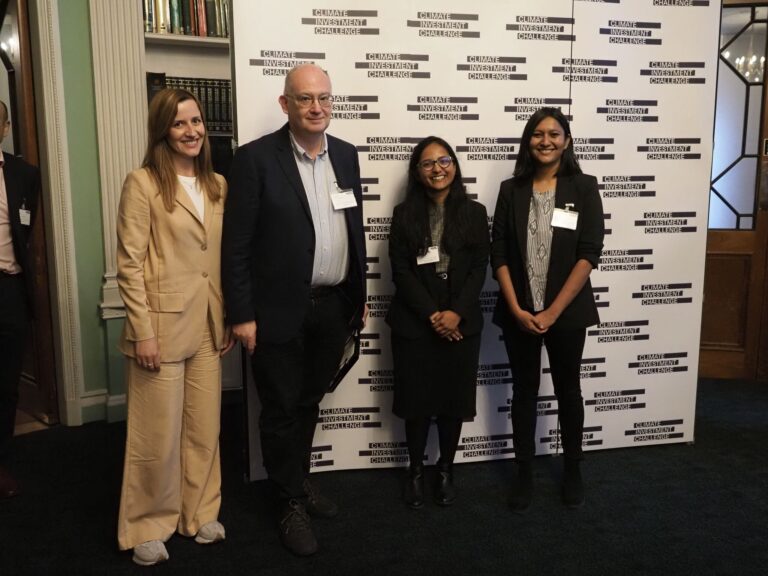Climate and environmental data are the foundations of a greener financial system. At CGFI, we are supporting an ecosystem of innovators that are developing the next generation of climate and environmental risk analytics for financial decision-making.
At the start of 2023 we established the Data Analytics Prize to stimulate new ideas for green finance analytical solutions and encourage the next generation of green fintech trailblazers. The Prize is for students’ solutions that apply climate and environmental datasets to improve the adoption of climate finance, and is part of Imperial College Business School’s Climate Investment Challenge (CIC). Our support for the Data Analytics Prize was made possible by sponsorship from the Natural Environment Research Council (NERC).
Team Reckon won the first edition of the Prize in 2023 and impressed the judges with their analytics solution for ‘Financing a Just Coal Transition’ which utilised climate, geospatial and economic data to understand physical and transition risks in India’s coal sector, with a specific focus on job losses. Our colleague Yllka Hysaj asked them to share their journey from problem to Prize.
Q&A - Reckon's journey to winning the 2023 Data Analytics Prize
Team Reckon, congratulations on your success in the CGFI Data Analytics Prize! Can you tell us more about your winning project?
The central theme of our project is advancing a just climate transition. We noticed that the financial services industry, including large banks such as UBS, Standard Chartered, and HSBC, have started discussions on the relevance of a just transition in their overall climate strategies.
However, there are no forward-looking quantifiable views for just transition decisions. The existing methodologies don’t accommodate the complex interlinkages of climate risk and social risk, and there are blind spots in identifying market opportunities that can mobilise capital towards just transition. Our project tries to address these needs using data analytics, socio-economic considerations and climate modelling.
What motivated your team to focus on just coal transitions and physical risk modelling?
We want to demonstrate that managing the physical risks of climate change is not decoupled from social risks – both from climate change itself but also from actions taken towards achieving net-zero.
Coal transitions are particularly pertinent because to stay on the IPCC’s 1.5C pathway coal power has to reduce by 87% by 2030. Coal provides 54% of power generation in low- and middle-income countries. A transition away from coal poses social risks such as unemployment in an unskilled labour force, while the transition process itself is expensive and requires capital mobilisation.
We also noted the relevance of the just coal transition to the financial services sector – for example, in GFANZ’s public consultation on “Financing the managed phase-out of coal fired power plants in Asia” – and to the needs of development organisations and countries that are developing market-based transition approaches. Lastly, we both have complementary skills and experience in climate risk, technology and public policy.
What was the inspiration behind your project, and how did you come up with the idea?
Our idea is an outcome of what we sadly witnessed in 2020 during the Covid lockdown in India. The sudden lockdown to deter the spread of coronavirus led to unprecedented forced migration and even casualties in the informal labour force, who were suddenly out of jobs and their daily incomes. Vulnerable communities in other parts of the world witnessed similar adverse economic impacts. We both agree that unplanned climate transitions can cause extreme socio-economic adversities. In India, the transition away from coal could result in the loss of up to 4.4 million jobs, with the greatest impact felt by informal and contract workers, and especially on women workers.
We want to proactively contribute to a solution so that capital is mobilised in a way that vulnerable communities are part of climate transition planning. We supported our brainstorming with primary and secondary research; we’re grateful to the academics and professionals who gave their time and their feedback.
Can you explain the key data and analytical components used in your methodology and approach?
Our data analytics approach aggregates existing climate scenarios with sectoral and regional data (such as employment rate and social protection indicators). We utilize the inputs in a predictive model that we’re building to translate scenario-wise social risk and opportunity due to a particular transition action. Collaboration is key for this, with knowledge partners who have expertise in IAMs and economic modelling, as well as with organisations that have grass-root data.
We are essentially trying to bring the same quantitative rigour to just transition decisions that banks and financial institutions employ in their other business decisions – such as regulatory stress testing or climate risk modelling. We also hope that in time data quality for social decisions will improve so that predictive models can give useful outputs with higher confidence.
What were the main challenges your team faced during the development of the idea and how are you planning to overcome them?
The main challenge we are facing is making our idea commercially viable. In the current context, there is still no mandated regulation for banks and FIs to cater to a just transition in their financing and risk assessments. After market research and putting our idea on a business model canvas, we are now considering how we could target a slightly different customer base, while keeping the original idea intact.
Our first step is to understand our customers better. We are interested in talking to stakeholders from the banking industry who have an interest in the just transition. We are also looking forward to speaking with experts in the climate modelling and social risk space to have a better conceptual soundness.
Another challenge is access to reliable ground data, which is crucial to building a model and product. We are exploring collaborations with institutions in India to overcome this challenge and to ensure we have a sufficient ear to the ground while we build our product.
What advice would you give to other teams or individuals interested in leveraging data analytics for green finance?
Our judges’ panel included Dr Brian Matthews of CGFI and Zarak Pasha (Director, Transition Finance) of Standard Chartered. They are experts in their respective fields and asked very pertinent questions related to feasibility, data quality, underlying processing component, and our business use case. We’d advise other teams to provide an overview of possible data sources, model methodology, climate/social impact, and key collaborations. Of course, the idea evolves over time and these details might change. But a simple but clear, well thought out pitch might be better than an ambitious but vague pitch.
How will collaboration with CGFI play a role in taking the idea forward?
To make a just transition a key component of decision-making in large financial institutions, it is essential for us to get close to the customers and understand their pain points. The collaboration with CGFI is opening doors for us to have these much-needed customer conversations which will help us refine our idea further and execute it better. We have also received ongoing feedback and advice in our conversations with CGFI including with Yllka, Brian and Janak. We also received a business model canvas coaching from Jim Shaikh (Greenhouse) thanks to this competition. When we get to the actual model development, the deep technical knowledge in CGFI regarding data analytics will help us understand what data we need and how to use them.
Entries for the 2024 Data Analytics Prize are now open! If you are a student – anywhere in the world, in any discipline – make sure to submit your innovative proposals, and you too could benefit from CGFI and Greenhouse support to take your ideas from concept to industry.



